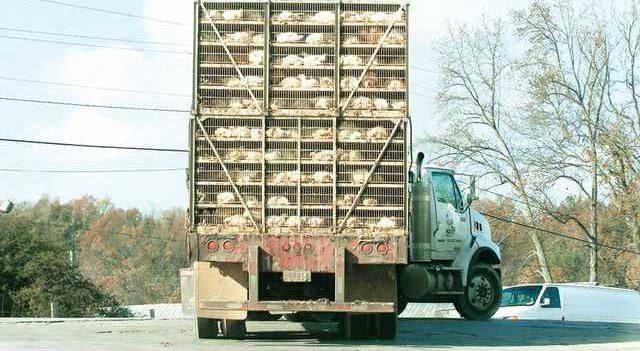1203truckaud
Abit Massey and Mike Giles of the Georgia Poultry Federation react to the chicken truck study.With its historic mansions, large trees and wide sidewalks, Gainesville’s Green Street is a favorite route for walkers and joggers.
But when a massive flatbed truck filled with caged chickens zooms by, some pedestrians cover their faces. For those who aren’t accustomed to it, the odor can be overpowering.
And some may have wondered whether the manure dust emanating from these trucks is more than just a nuisance. Could it harm human health?
No one has done a study on pedestrians. But researchers at Johns Hopkins University’s Bloomberg School of Public Health recently analyzed the types of bacteria that end up on (and inside of) cars that drive behind chicken trucks.
Johns Hopkins is located near the Delmarva Peninsula, a region that comprises portions of Delaware, Maryland and Virginia and has a high concentration of poultry farms. Researchers drove for 17 miles behind chicken trucks with their cars’ air conditioning turned off and the windows rolled down.
Afterward, they found elevated levels of bacteria on surfaces both inside and outside the cars. They also tested the air in the cars and found increased concentrations of airborne bacteria.
Some of these bacterial strains were resistant to three common types of antibiotics used to treat infections in humans. Those drugs also are approved by the U.S. Food and Drug Administration for use as feed additives for broiler poultry.
However, the study provided no evidence that anyone has ever gotten sick from driving behind a chicken truck.
"If there were any effect at all, we would see it in Georgia because we’re the biggest poultry-producing state," said Michael Lacy, head of the Department of Poultry Science at the University of Georgia.
"If it were affecting us, you would see the hospitals full of people getting sick from exposure to chicken waste, and obviously that’s not happening."
Lacy said it was "a natural question" for people to ask about the health risks of being near chicken trucks. But he said the Johns Hopkins study seemed to be trying to create a link between chickens and drug-resistant bacteria.
"It’s a jump in logic," he said. "You can probably find antibiotic-resistant bacteria almost anywhere you look. But there’s little direct evidence that livestock has been the primary cause of the development of antibiotic-resistant bacteria."
Some consumers have blamed the proliferation of these bacteria on the meat industry, because it was once common practice for farmers to routinely feed antibiotics to animals as a preventive measure.
But Lacy said the practice isn’t as widespread as it used to be. "The trend is toward going antibiotic-free, because consumers want it," he said.
But even if the bacteria aren’t harmful, a lot of people are just grossed out at the thought of chicken trucks leaving a trail of fecal dust as they roar down the road.
Audra Cochran, a sophomore at Brenau University, runs along Green Street several days a week as she trains with the cross-country team.
"When a truck comes through, we try to move away from it as much as we can," she said. "I was worried about them initially because they don’t smell too nice, and I thought, ‘This can’t be good for your health.’"
However, Cochran said she hasn’t gotten sick from the exposure, so she’s not as concerned about it as she used to be.
Pat Braswell, director of Hall County Environmental Health, said she hasn’t received any complaints about chicken trucks.
"We’ve never had anybody call our office with a concern about that," she said. "I can’t imagine that there’s any public health threat. I wouldn’t think your exposure to manure would be any different from someone who’s working with farm animals, such as cleaning out stalls."
Braswell said there’s something else the runners on Green Street should be worried about.
"Exhaust fumes, from vehicles in general, are probably worse than anything they would get from a chicken truck," she said. "Everybody knows that running on city streets can cause lung problems (from smog emissions)."
Not surprisingly, the Washington, D.C.-based National Chicken Council issued a scathing response to the Johns Hopkins study, calling it "unrealistic."
"Few people would choose to tailgate a load of live chickens for 17 miles with the windows rolled down," said council spokesman Richard Lobb. "Tailgating a tractor-trailer is much more dangerous than being around live chickens."

